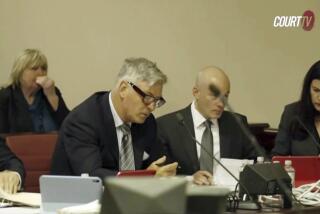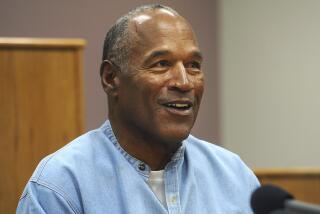Prospective Jurors Offer Variety of Excuses to Avoid Simpson Trial
- Share via
Jury selection in the O.J. Simpson civil trial opened Wednesday with a clear theme: It will be tough to find people willing to serve on a four-month trial, let alone people untainted by the overwhelming publicity that has drenched the case.
Prospective panelists summoned to the Santa Monica Courthouse tried all kinds of excuses to knock themselves out of contention.
They claimed medical problems, claustrophobia, stress. One woman said she had purchased nonrefundable airline tickets to Hawaii. Another claimed she absolutely had to visit her daughter in Seattle. One man said he needed to take care of his three grandchildren since their parents were on drugs. A woman insisted that she had to look after her dying mother-in-law.
One man used the blunt approach, noting on a questionnaire: “I have a life outside jury duty.”
But Superior Court Judge Hiroshi Fujisaki made it clear that he would not buy any old excuse.
Before he would excuse those with travel plans, he demanded to see their tickets. Before he let off a pastor, he demanded to hear why the congregation needed him. He released a pregnant woman, but retained a man with high blood pressure, saying court schedules could be shifted to accommodate his medical appointments if he ended up on the jury.
For all his brusque skepticism, Fujisaki did try to make jury duty sound at least reasonably tolerable. He pointed out that the jurors will sit in comfy padded chairs and said the court would provide them with lunch each day. And he reminded them that jury duty is not like a full-time job: no late hours, no weekend work. “It’s not going to be so hard,” he told one reluctant panelist.
The 168 jurors who arrived in court Wednesday are the first of about 400 under consideration for the Simpson jury. Half of the first 42 interviewed by Fujisaki were dismissed for hardship.
Those who cannot persuade the judge that serving would be a hardship must fill out a questionnaire probing their exposure to publicity about the Simpson case. Those who pass that stage will answer still more written and oral questions about their attitudes toward domestic violence, racism, police misconduct and other relevant issues.
In the end, Fujisaki hopes to seat a panel of 20--the jury of 12 and eight alternates.
In an indication of how tough it will be to find a panel untainted by the publicity that has saturated the Simpson case from the start, several of the prospective jurors walked in Wednesday reading newspaper articles about pretrial motions. Just to get to the metal detector at the door, they had to pass by a gaggle of television cameras, plus several demonstrators holding signs and T-shirts vilifying Simpson.
Court statistics indicate that the jury pool that feeds Santa Monica is 79% white, but the group summoned on the first day of selection was remarkably diverse. Black and white, Latino and Asian, they queued up on the second floor, leafing through John Grisham novels, casting curious glances at the reporters nearby and fanning themselves with their juror summons.
While the jurors were busy checking in with the court and answering questions about hardship, Fujisaki held a brief but important hearing. At issue was some controversial evidence that could bolster the plaintiffs’ contention that a trail of blood leads from the Brentwood murder scene to Simpson’s home.
Chemical tests performed early in the investigation into the murders of Nicole Brown Simpson and Ronald Lyle Goldman revealed that blood may have been present in Simpson’s sink and shower, and on an air conditioner behind his guest house, near the spot where a bloody glove was found. The test results, however, were never confirmed, so experts cannot say with certainty that the substance uncovered was definitely human blood--much less pinpoint a likely source.
Even though the tests are speculative, the plaintiffs seeking to hold Simpson accountable for the murders are eager for jurors to hear about them. As Thomas P. Lambert, an attorney for Goldman’s father Fred, wrote in a motion: “The evidence is critical to refute Simpson’s argument--made at the criminal trial--that the amount of blood found at Simpson’s Rockingham residence is not consistent with Simpson having committed the extremely bloody murders at Bundy and then having returned to Rockingham.”
Simpson’s defense team blocked all testimony about the tests in the criminal trial, but Fujisaki indicated Wednesday that he would consider allowing the results into the civil trial.
Expressing confidence that jurors would be able to understand that the tests do not prove the existence of blood but simply suggest the possibility, Fujisaki said: “I think anyone who had high school or college chemistry or qualitative analysis would understand the difference.”
Before he makes a final decision, Fujisaki said he would hold a hearing outside the jury’s presence at which scientists could testify about the validity and value of such blood tests.
In other cases across the nation where the issue has come up, Fujisaki said, judges “seem to generally state almost in an offhand fashion that . . . these tests are generally accepted in the scientific community as an indication of blood.”
More to Read
Sign up for Essential California
The most important California stories and recommendations in your inbox every morning.
You may occasionally receive promotional content from the Los Angeles Times.













